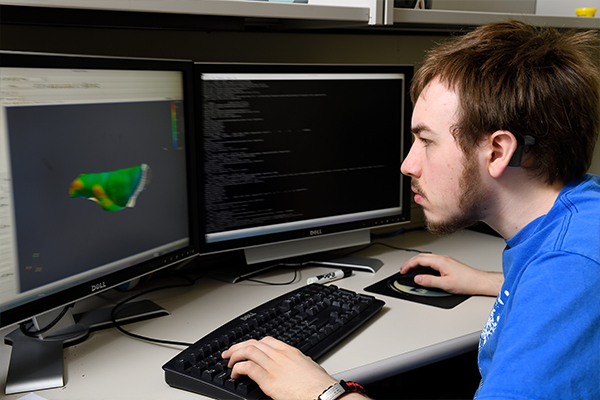Meet the BME summer student researchers: Sam Bidwell

Each summer, approximately two dozen high school and undergraduate students join the Johns Hopkins Department of Biomedical Engineering for the opportunity to gain hands-on research experience under the mentorship of our pioneering faculty. Meet Sam Bidwell, one of five undergraduate students with hearing loss who will conduct research in Johns Hopkins auditory science and engineering labs this summer as part of the STEM-HEAR initiative spearheaded by Tilak Ratnanather, associate research professor of biomedical engineering.
Name: Sam Bidwell
Hometown: Bloomfield, CT
School: Wesleyan University
Mentor: Tilak Ratnanather, associate research professor of biomedical engineering
Can you tell us about what it was like growing up with hearing loss?
I was diagnosed with meningitis when I was about 11 months old. One of the side effects from the disease or the treatment was that the hair cells in my cochlea died, causing me to lose my hearing. My parents recognized very quickly that I was no longer getting enjoyment from my loud toys. I was given a hearing aid, but my hearing degenerated so quickly that it didn’t help, and I received a cochlear implant shortly after, within three months of losing my hearing. Now, I can hear almost as well as a person without hearing loss, but there have been times when my implants have made things more difficult, like when people don’t want to use the devices that will help me to hear them better. Still, that’s pretty rare.
How has your hearing loss affected your educational experiences?
I went to a small private elementary school that didn’t offer much support for deaf students. There were no hearing-impaired teachers, so there weren’t many people I could talk to if I had any issues. My parents took an active role early on in my education. My mom fought for my ability to get an education and has always been my best advocate. As I got older, I began advocating for myself. Even when I transferred to a public school that provided me with some additional resources, I relied on my own self-advocacy. I was always motivated by my interest in math rather than by my deafness. For me, it was something I had to overcome, not something I had to incorporate into everything.
How did you hear about the Johns Hopkins internship program?
Growing up, I volunteered with my local chapter of the Hearing Loss Association of America. The woman in charge suggested that I look into a particular summer camp run by the [Alexander Graham] Bell Association [for the Deaf and Hard of Hearing]. While I was in this program, one of the AG Bell financial officers introduced me to Tilak. We’ve had an on-and-off conversation going for a couple of years, and at one point, I mentioned that I was looking for an internship. Tilak was very generous and extended the opportunity for me to conduct summer research here at Hopkins.
Can you describe your research project?
My goal is to improve the segmentation of the six neural layers in the brain’s cortex, specifically in and around the Heschl’s gyrus, which contains the primary auditory cortex. Starting with the raw, three-dimensional image of the Heschl’s gyrus, I segment it manually, highlighting each cortical layer as a separate set of pixels. [Defining the cortical layers] is largely an unsolved problem because the starting images themselves can vary wildly in both quality and color, so a program that’s too fixed on a single type of image won’t produce a general solution. I’ve been working on automating a lot of my work because the human eye is not always reliable, and I’ve gotten to the point where I can do a very good automatic segmentation with minimal manual input. The whole point of the project is to improve the segmentation of the neural layers so that you can easily see the changes in the neural structure under various conditions, such as being deaf.
What do you hope to learn or gain from this experience?
Along with hands-on experience, this internship is helping me to understand potential applications for fields like mathematics and biomedical imaging. It’s interesting to see how subjects you wouldn’t normally associate with math can still involve a lot of math. I’m realizing that there are many more career options out there than I thought. As a math major, I don’t have to become an actuary or a math professor.
What are your plans for the future?
I know my future career will be heavily math related, and I’ve been thinking about becoming a math professor after I earn my PhD. There are some other alternatives I’m also considering. For example, maybe I’ll go for a physics professorship instead. Maybe I’ll go into astronomy. Maybe I’ll do something else. Whatever I do, it’s definitely going to involve a lot of mathematics, but I’ve got about 10 years to figure that out.
What advice do you have for other students with hearing loss?
I think it’s helpful to have role models who are deaf, but it’s also just as important, if not more so, to realize that you don’t have to let your deafness define you. You can define it. You can let it be your motivation, but it’s okay to be motivated by other things, too.
Just because people say you can’t or shouldn’t do something, doesn’t mean that you can’t or shouldn’t do it. For instance, I was told that I would never progress beyond a second-grade reading level, and now I’m a voracious reader. There are many things people will say we can’t do, but often times, it’s just because no one has ever bothered to try.
Getting a cochlear implant and going “mainstream” was the best choice for me. It may not be the best choice for others. There is no one-size-fits-all solution. Everyone will shape [his or her] own life experiences.
